 Screening Francis Ford Coppola's You're a Big Boy Now -- the filmmaker's MFA thesis film -- feels, perhaps appropriately enough, like an academic exercise. (Indeed, I might recommend screening it -- were I to recommend screening it at all -- with Mark Harris's Pictures at a Revolution at your side, his astute references to the film flagged for easy perusal...something I now wish I had done.) Occasionally fascinating but rarely genuinely entertaining, Coppola's debut feature seems -- like so much of the filmmaker's work -- to be both a throwback and a flash forward, its burgeoning formal whimsy enervated by its reverence for the formalities of history/convention. (The film's adoration of Times Square at night, as well as its fascination with the action in the bowels of the New York Public Library, emerge as the most exciting parts of this curiously turgid romantic caper.) This film is also a harbinger of Coppola's excellent knack for assembling collaborators, especially actors and designers, perhaps most notable here in the film's "introduction" of the now legendary Karen Black and its featured, nominated performance by...
Screening Francis Ford Coppola's You're a Big Boy Now -- the filmmaker's MFA thesis film -- feels, perhaps appropriately enough, like an academic exercise. (Indeed, I might recommend screening it -- were I to recommend screening it at all -- with Mark Harris's Pictures at a Revolution at your side, his astute references to the film flagged for easy perusal...something I now wish I had done.) Occasionally fascinating but rarely genuinely entertaining, Coppola's debut feature seems -- like so much of the filmmaker's work -- to be both a throwback and a flash forward, its burgeoning formal whimsy enervated by its reverence for the formalities of history/convention. (The film's adoration of Times Square at night, as well as its fascination with the action in the bowels of the New York Public Library, emerge as the most exciting parts of this curiously turgid romantic caper.) This film is also a harbinger of Coppola's excellent knack for assembling collaborators, especially actors and designers, perhaps most notable here in the film's "introduction" of the now legendary Karen Black and its featured, nominated performance by...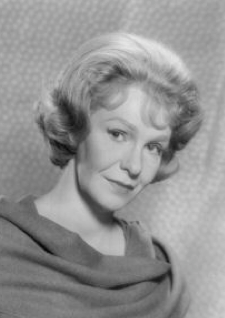
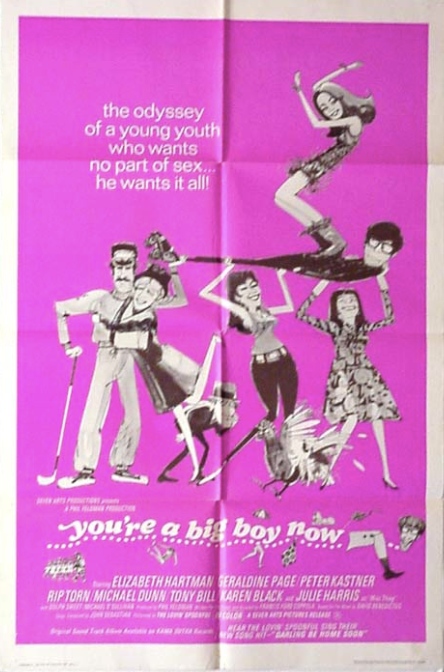
...Geraldine Page in You're a Big Boy Now (1966)
approximately 13 minutes and 2 seconds
10 scenes
roughly 14% of film's total running time
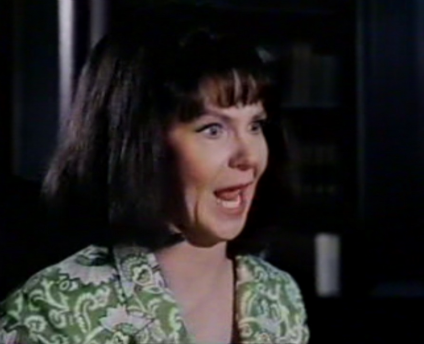 Page's Margery Chanticleer is the sort of suburban housewife who exists for (and through) her children -- or child, in this case. As presented by Page and writer/director Francis Ford Coppola, Margery transforms her every maternal virtue into a vice through simple excess. Indeed, on almost every count, Page's Margery is just too much.
Page's Margery Chanticleer is the sort of suburban housewife who exists for (and through) her children -- or child, in this case. As presented by Page and writer/director Francis Ford Coppola, Margery transforms her every maternal virtue into a vice through simple excess. Indeed, on almost every count, Page's Margery is just too much. Her doting is domineering, her attentiveness obsessive, and her propriety prudish.
Her doting is domineering, her attentiveness obsessive, and her propriety prudish.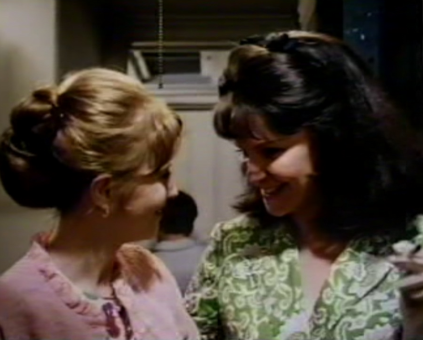 Primary among Margery's domineering, prudish obsessions is her quixotic quest to keep Bernard away from girls, because -- at 19 -- "he's just too young." So, when her husband (Rip Torn, in a glib yet incisive performance) insists that Bernard take his own apartment in the city, Page's Margery strikes a deal with the improbably-named landlady, Miss Thing (Julie Harris incongruously cast in a role better suited for Elsa Lanchester, Doris Roberts, or Divine) to telephone immediately should Bernard become involved with a girl.
Primary among Margery's domineering, prudish obsessions is her quixotic quest to keep Bernard away from girls, because -- at 19 -- "he's just too young." So, when her husband (Rip Torn, in a glib yet incisive performance) insists that Bernard take his own apartment in the city, Page's Margery strikes a deal with the improbably-named landlady, Miss Thing (Julie Harris incongruously cast in a role better suited for Elsa Lanchester, Doris Roberts, or Divine) to telephone immediately should Bernard become involved with a girl.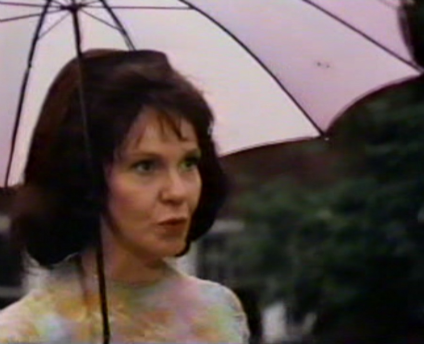 The film understands Page's Margery to be a prim neurotic, prone to hysteric fits and shrieking remonstrations (an approach that permits the actress to deploy her vast arsenal of tics in service of the role).
The film understands Page's Margery to be a prim neurotic, prone to hysteric fits and shrieking remonstrations (an approach that permits the actress to deploy her vast arsenal of tics in service of the role).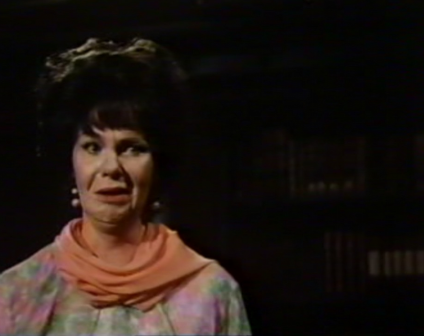 The actress, however, also understands Margery to be a desperately vain and frightened woman, a woman who's so terrified of middle age that she does everything in her power to keep her son a child. It's an interesting move, on Page's part, to develop such dimension and depth for this basically non-dimensional role.
The actress, however, also understands Margery to be a desperately vain and frightened woman, a woman who's so terrified of middle age that she does everything in her power to keep her son a child. It's an interesting move, on Page's part, to develop such dimension and depth for this basically non-dimensional role.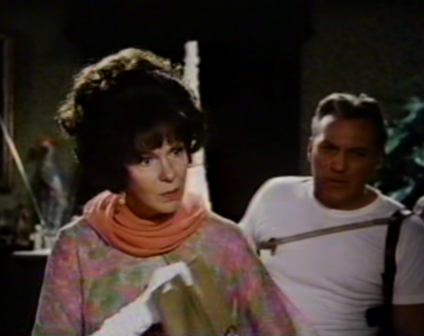 That said, I'm not entirely sure that Page's psychologically sophisticated approach to the character actually serves what should be a broad comedic performance. (To put it bluntly, Geraldine Page ain't no Nancy Walker...and this role needs a Nancy Walker.)
That said, I'm not entirely sure that Page's psychologically sophisticated approach to the character actually serves what should be a broad comedic performance. (To put it bluntly, Geraldine Page ain't no Nancy Walker...and this role needs a Nancy Walker.)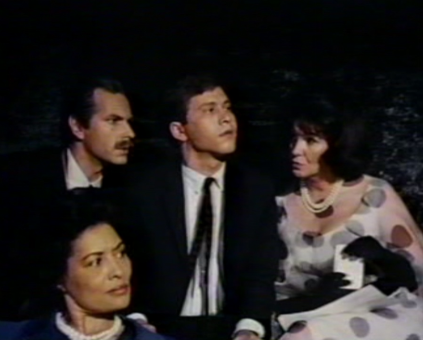 Glimmers of humor -- often via Theoni V. Aldredge's gloriously funny (yet apt) costumes and wigs -- do manifest in the role. (Just track all the business that Page develops around her giant Dairy Queen wig in the the final confrontation/chase sequence.) But Page's Margery is, for the most part, a basically unfunny performance of an stock comedic role. (Torn deploys just as much "business" in his role, yet somehow maintains a lightness of touch that helps sustain the comedic possibilities of a scene.)
Glimmers of humor -- often via Theoni V. Aldredge's gloriously funny (yet apt) costumes and wigs -- do manifest in the role. (Just track all the business that Page develops around her giant Dairy Queen wig in the the final confrontation/chase sequence.) But Page's Margery is, for the most part, a basically unfunny performance of an stock comedic role. (Torn deploys just as much "business" in his role, yet somehow maintains a lightness of touch that helps sustain the comedic possibilities of a scene.)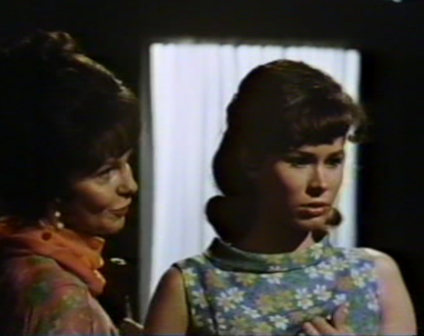 And perhaps most interesting, Page's decision to wrap Margery in a jittery caul of defensive self-obsession has the disastrous, though possibly inadvertent, side effect of disrupting any possible chemistry or comedic rhythm she might find with her impressive roster of costars. Page barks, she wails, she steamrolls -- but she never connects.
And perhaps most interesting, Page's decision to wrap Margery in a jittery caul of defensive self-obsession has the disastrous, though possibly inadvertent, side effect of disrupting any possible chemistry or comedic rhythm she might find with her impressive roster of costars. Page barks, she wails, she steamrolls -- but she never connects.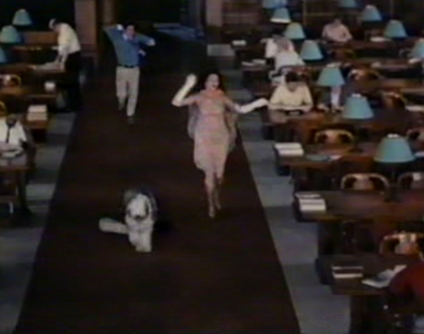 Neither a "coaster" nor a "breakthrough" nor a nearly hidden "gem," Page's is a negligible little performance in a wackadoodle little comedy, occasionally interesting but...that's about it.
Neither a "coaster" nor a "breakthrough" nor a nearly hidden "gem," Page's is a negligible little performance in a wackadoodle little comedy, occasionally interesting but...that's about it.
4 comments:
I think I've seen the first half of this picture. I remember thinking it a totally nutso movie and then I don't think I finished it.
In my head, I also have to confess to getting this film and The Sterile Cuckoo totally confused with one another.
I haven't seen most of Geraldine Page's nominated performances, but I get the feeling that she was a highly respected actress who got most of her nominations (and her win) all for the wrong performances.
Although it's directed by someone as famous as Coppola, this film is unfortunately impossible to find over here.
It surprises me that Coppola managed to assemble such an all-star cast for a STUDENT film. I mean, Karen Black wasn't famous at the time, but Geraldine Page and Julie Harris were already big names, Rip Torn was pretty famous and Elizabeth Hartman had just come off a huge breakthrough.
I have now watched this, Alfie and about a third of Hawaii, and I can say that this is the wierdest year for SA that I've seen. Completely oddball.
Post a Comment